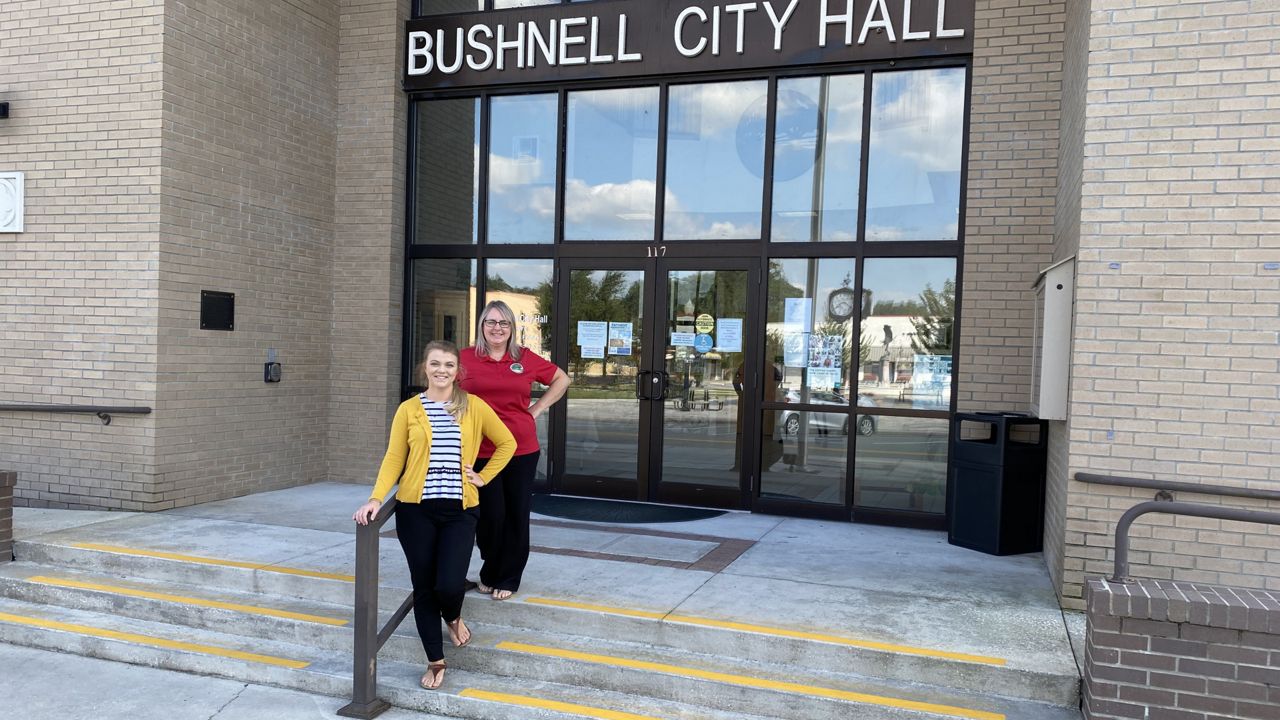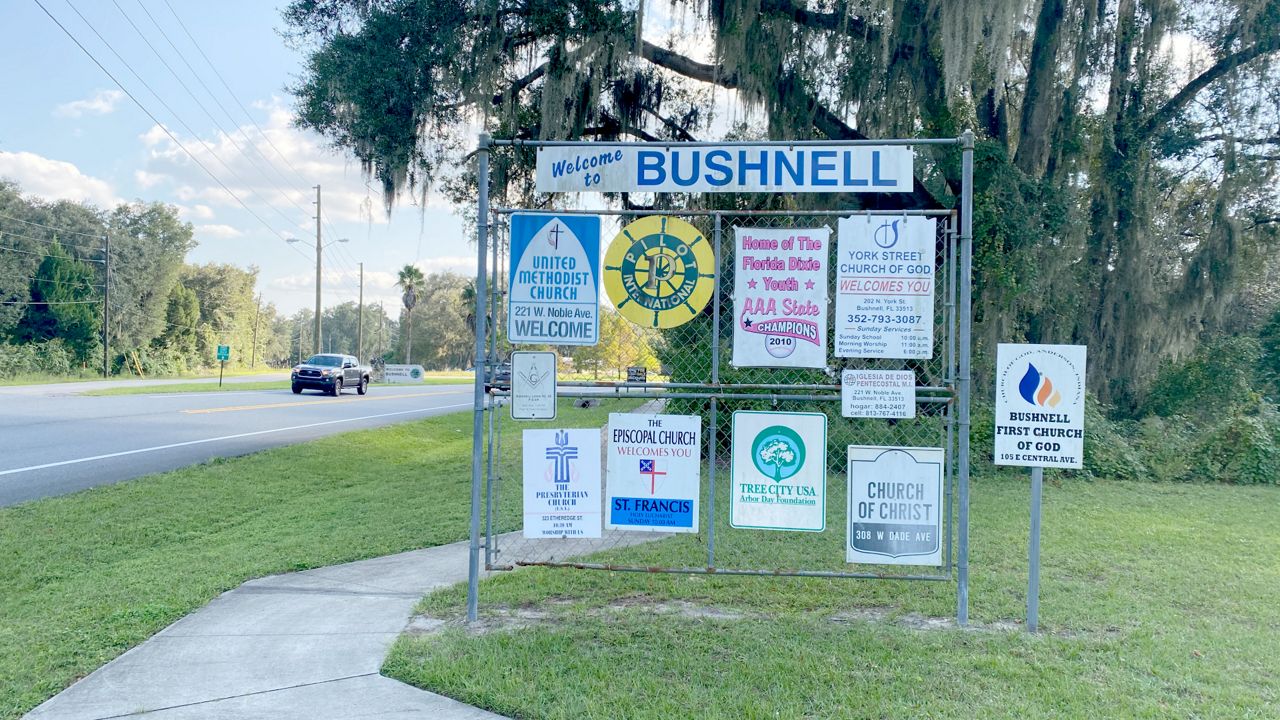BUSHNELL, Fla. — The City of Bushnell welcomes you. It welcomes you so much that as you drive into town on U.S. 301 South, you encounter two signs about 100 yards apart that say, “Welcome to Bushnell.”
What You Need To Know
- Bushnell census response rate of 40% lowest among Central Florida county seats
- US census decides allocation of billions in federal funding to municipalities
- Leaders of small cities say residents are hurt when population is undercounted
- If you haven’t been counted, you have until 5:59 a.m. Friday to submit online form
- HOW TO PARTICIPATE: Visit the U.S. Census 2020 website
Bushnell also welcomes you to walk into any business and start asking questions, including about the 2020 U.S. census.
“I think it's a good thing,” said Lisa Chamblee, owner of a title company in the city’s old business district. “It helps keep track of how many people are in the area, of what's needed, what could be needed in the future and the near future.
“And, yes, I filled it out.”
In that respect, Chamblee stands among the outnumbered in this small Sumter County municipality.
Fewer than half of Bushnell residents have responded to the U.S. Census Bureau’s call to complete questionnaires for its 2020 population count.
The Census Bureau puts the city’s self-response rate at 40 percent — by far the lowest among nine Central Florida county seats that Spectrum News 13 reviewed. It also falls well below Florida’s overall rate of 63.7 percent.
Bushnell City Clerk Christina Dixon said Tuesday that a relatively high percentage of renters might contribute to the low census participation. Nonetheless, she said, the city was doing what it could to encourage residents to complete their census forms before the end of this month.
“They don't really see the importance of their voice in the census,” said Bushnell City Hall employee Kristin Ray, who helps the city promote the census. “We’ve been trying to stress to our community that this is the time that their opinion does count.”
But on Wednesday, the Census Bureau said it would stop the census this week, giving people until 5:59 a.m. Friday to submit a questionnaire online and Thursday to mail or phone in their questionnaires. The Census Bureau also declared that Thursday is the last day workers would try to reach households that failed to submit the forms.

City of Bushnell employees Kristin Ray (left) and Christina Dixon say the city has tried to inspire more census participation among residents. (Pete Reinwald/Spectrum News 13)
The Census Bureau’s move came after a Supreme Court ruling gave the Trump administration the ability to stop the census before the October 31 deadline.
The Trump administration has maintained that it needs to stop the census early in order to meet a December 31 deadline for delivering the results to the president.
Yet experts and officials emphasize the need to ensure that everybody gets counted. The census determines how local and congressional districts get drawn, and it decides allocation of billions of dollars in federal funding to cities and municipalities for roads, hospitals, schools, Pell grants, and other grants and programs.
Advocates worry that poor people and minority groups are among the most affected when the census undercounts the population.
And that, some say, especially affects small cities and rural communities, including many in Central Florida.
Take the Volusia County city of Oak Hill — population 1,792, according to the 2010 census.
“Our population is so small that any adjustment in it does affect eventually our revenue stream,” City Administrator Kohn Evans said. “So, it is important for a small city to be counted properly.”
About 54 percent of Oak Hill residents completed their census forms, according to Census Bureau data. Evans said her city continues to struggle to find ways to get participation from residents.
As for the Census Bureau’s decision to end the census this week, she said: “I believe more time doesn’t hurt, but I also understand deadlines.”
In an announcement that drew skeptics, the Census Bureau said this month that “over 99 percent of housing units have been accounted for in the 2020 Census.” More than 66 percent of that came from people’s responses to surveys, while another 33 percent came from Census Bureau workers and operations, the bureau said.
Rebecca Hammock, Seminole County’s development services director, suggested that the new deadline would hurt rural and urban areas alike. The Census Bureau’s decision “will impact and cut short efforts by the county and its municipalities to reach out to hard-to-count areas with census messaging,” she wrote in an email to Spectrum News 13.
In Bushnell, officials said Wednesday — after the Supreme Court decision — that they couldn’t say whether they would continue their efforts to get the word out.
On Tuesday, they said they’d been posting census reminders on Facebook, and mentioned the census to residents who called in to pay their utility bills. They also kept the City Hall lobby full of census literature, including a free children’s book called “Everyone Counts.”
About 25 percent of people in this city of about 7,300 live in poverty, according to 2019 U.S. census estimates.
Residents who have yet to submit their census forms are running out of time to do so.
“This is when the government needs to know how many people are living on your street,” Bushnell City Hall worker Ray told Spectrum News 13 on Tuesday. “This is when they need to know if we have a need for more day cares, more schools, more representation. This is when that is important. And I think a lot of our community isn't aware of that.
“So that's what we've been pushing — that this is when their voice does count.”



